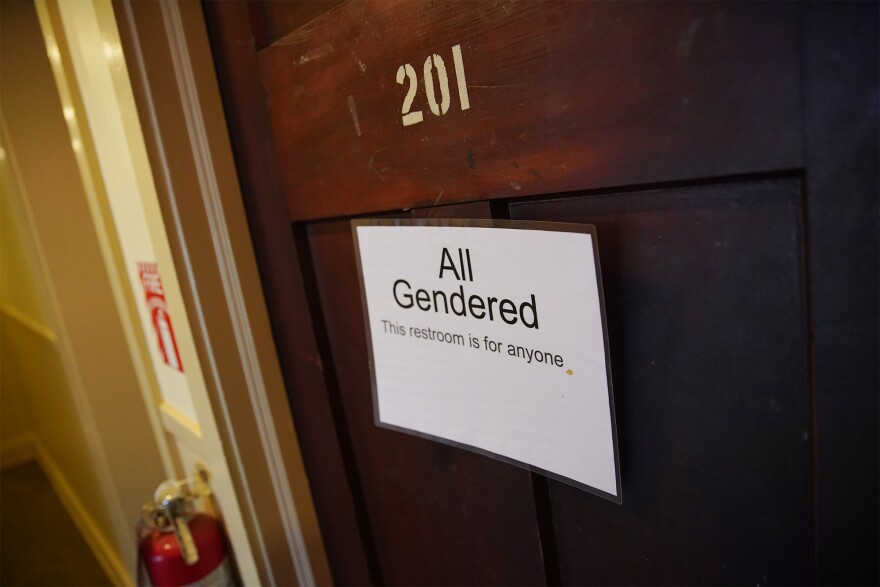Like many transgender people, Kaden Jarosz is cautious about where he goes to the bathroom for his own safety.
"We literally just want to do what we got to do and get out," said Jarosz, a 19-year-old Oberlin College student and transgender man.
One place where he didn't have to worry about using the bathroom was in his dorm. It had one gender-neutral bathroom and two other multi-stalled bathrooms that use the "E-system" to indicate with whom they're comfortable sharing the space. "E" stands for "everyone."
"It's usually on 'everyone,' so you do that," he said as he reattached a sheet of laminated paper to the door with Velcro so "E" faced upright. "If you are only aligned with wanting women in the restroom or people who identify as women in the restroom, flip it like that."
He flipped the sheet of paper again, which also had the option for total privacy with "me, myself and I."
"It works. It works really well," Jarosz said.

Under Ohio law, the "E-system" would be illegal starting on Feb. 25. Oberlin has now scrapped it and converted the dorm bathrooms to two single, all-gender restrooms and one women's room.
Since Jarosz lives on campus, his dorm is subject to the “Protect All Students Act.” Often called the transgender bathroom ban, the new law requires Ohio schools to designate multi-occupancy restrooms, locker rooms and "overnight accommodations" for exclusive use by male or female students based on their original birth certificate.
That means thousands of transgender students, staff and visitors across the state will no longer be able to legally use the bathroom that corresponds with their gender.
"Honestly, it's very demoralizing because like... even though this was a safe place, it might not be anymore," Jarosz said.
Transgender youth and their families as well as legal experts are watching the upcoming implementation of the law with trepidation. They say it is unclear how the law will be enforced, and they have questions about the practical application of the law, including, who will check whether an individual in a school restroom is in the bathroom that corresponds with the sex on their birth certificate — and how they might do that.
"It certainly is signaling. It's certainly terrifying and threatening to trans students and their families," said Freda Levenson, the legal director of the American Civil Liberties Union of Ohio. "It also creates questions about the fairness of implementation."
Ohio Rep. Adam Bird, R-New Richmond, one of the bill's sponsors, said in testimony before the Ohio House education committee in 2023 that school leaders asked him to create such a bill for consistency across the state.
Levenson said it will do the opposite.
"It makes it very difficult for people and also educational institutions to negotiate this," Levenson said.
It’s hard to be certain what punishments noncompliant schools or individuals may face: there’s no enforcement outlined in the bill.
We want to protect our children from exposure to the opposite sex while in a private place like a restroom or locker room.Ohio Rep. Adam Bird, R - New Richmond
At least a dozen other states have similar laws, an analysis by Ideastream Public Media showed. Enforcement isn’t clear in those places either. It does not appear anyone has been charged with violating bans in other states, although LGBTQ+ advocacy groups say it’s hard to be certain.
Even without punitive measures, the new law may embolden private citizens to take enforcement into their own hands, said Jory Ross, a 31-year-old doctoral student and graduate teaching associate at Ohio State University.
"OK, so the law says you're not allowed to be in this room based on what I'm guessing is in your pants or what I'm guessing was originally on your birth certificate," Ross said. "And so that's just sort of like license to be you, to be deeply unpleasant to trans people just trying to live their lives."
The legislation is intended to protect other students who may feel unsafe, according to Bird.
"We want to protect our children from exposure to the opposite sex while in a private place like a restroom or locker room," he said in his testimony.

Ross, a transgender woman, wonders how this would work.
"My expectation is at the college level... we're not about to start having, like, actual bathroom monitors," she said.
Levenson said with so much legal ambiguity, Republicans who supported the law may be more effectively creating a sense of discomfort and fear for trans people.
"It's cruel," she said. "It's benighted. It could lead to very serious psychological and even physical problems for the most vulnerable."
About 3% of high school students identify as transgender, according to data from the U.S. Centers for Disease Control and Prevention. It’s a population that’s already at risk: 81% of transgender adults say they have contemplated suicide in their lives and 42% have attempted it, according to the Williams Institute, which studies sexual orientation and gender identity law and public policy. And studies show that transgender youth who can’t use the bathroom that aligns with their gender are at a greater risk of sexual violence.
The bill's other sponsor Rep. Beth Lear, R-Galena, said in her testimony that she’s also worried about trans students who could make what she calls life-altering decisions at a young age.
"Children are more apt to act rashly, less likely, or able to be thoughtful and rely more on feelings than reality," she said.
Lear said she doesn't believe in anything beyond two genders: male and female, assigned at birth.
"What about truth? What about reality?" she said. "Boys cannot become girls, and girls cannot become boys. You can dress up and pretend, but you cannot change your DNA."
An estimated 1 in 100 Americans is intersex, meaning they have genitals, chromosomes or reproductive organs that do not fit into a male and female sex binary.
Medical professionals typically assign a sex when a baby is born, including for people with intersex traits. Based on the legislation's language, intersex people will have to use the bathroom that aligns with the sex assigned at birth.
Neither Lear nor Bird replied to requests for comment. The Ohio Senate sponsors, Jerry Cirino, R-Kirtland, and Andrew Brenner, R-Delaware, who rolled the bill into legislation regarding changes to the state's College Credit Plus program, did not respond and deferred comment to the original bill's sponsors.
But even if there were people checking, 19-year-old Oberlin College student Rai said it’s not always easy to know if someone is trans.
Rai, who did not want to provide his last name to protect his safety, has already begun medically transitioning through hormone replacement therapy, which makes him develop traditionally male characteristics like a deeper voice and facial hair.
He's used the women's restroom before — as soon required by Ohio law — and said he's gotten looks and comments from those who aren’t comfortable.
"I’m just going pee. Like, I just need to wash my hands, and I'll leave," Rai said. "It's a really uncomfortable situation."
I feel like I'm making other people uncomfortable. But truly, I'm a human being who needs to go to the bathroom.Rai, 19-year-old student
Jory Ross worries that conservatives are testing how far they can push legislation against transgender people.
"If I am being barred from using the bathroom at my place of employment, then I don't know how I could continue to live in Ohio long-term," she said. "I don't know how I could have a future here. And that really sucks."
Levenson said the ACLU of Ohio will be closely monitoring the law’s implementation and enforcement.
If you or someone you know may be considering suicide, contact the 988 Suicide & Crisis Lifeline by dialing or texting 988.






